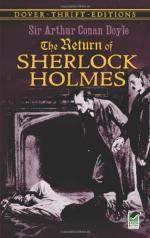Lestrade began to laugh.
“You are too many for me when you begin to get on your theories, Mr. Holmes,” said he. “How does this bear on the case?”
“Well, it corroborates the young man’s story to the extent that the will was drawn up by Jonas Oldacre in his journey yesterday. It is curious—is it not?—that a man should draw up so important a document in so haphazard a fashion. It suggests that he did not think it was going to be of much practical importance. If a man drew up a will which he did not intend ever to be effective, he might do it so.”
“Well, he drew up his own death warrant at the same time,” said Lestrade.
“Oh, you think so?”
“Don’t you?”
“Well, it is quite possible, but the case is not clear to me yet.”
“Not clear? Well, if that isn’t clear, what could be clear? Here is a young man who learns suddenly that, if a certain older man dies, he will succeed to a fortune. What does he do? He says nothing to anyone, but he arranges that he shall go out on some pretext to see his client that night. He waits until the only other person in the house is in bed, and then in the solitude of a man’s room he murders him, burns his body in the wood-pile, and departs to a neighbouring hotel. The blood-stains in the room and also on the stick are very slight. It is probable that he imagined his crime to be a bloodless one, and hoped that if the body were consumed it would hide all traces of the method of his death—traces which, for some reason, must have pointed to him. Is not all this obvious?”
“It strikes me, my good Lestrade, as being just a trifle too obvious,” said Holmes. “You do not add imagination to your other great qualities, but if you could for one moment put yourself in the place of this young man, would you choose the very night after the will had been made to commit your crime? Would it not seem dangerous to you to make so very close a relation between the two incidents? Again, would you choose an occasion when you are known to be in the house, when a servant has let you in? And, finally, would you take the great pains to conceal the body, and yet leave your own stick as a sign that you were the criminal? Confess, Lestrade, that all this is very unlikely.”
“As to the stick, Mr. Holmes, you know as well as I do that a criminal is often flurried, and does such things, which a cool man would avoid. He was very likely afraid to go back to the room. Give me another theory that would fit the facts.”
“I could very easily give you half a dozen,” said Holmes. “Here for example, is a very possible and even probable one. I make you a free present of it. The older man is showing documents which are of evident value. A passing tramp sees them through the window, the blind of which is only half down. Exit the solicitor. Enter the tramp! He seizes a stick, which he observes there, kills Oldacre, and departs after burning the body.”




